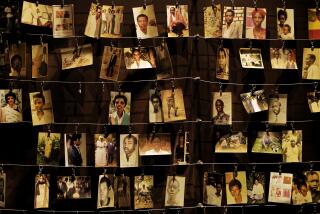From Bay of Pigs to Bay of Goats, History Would Repeat Itself
- Share via
Secretary of State Colin Powell has locked in a policy against Saddam Hussein that is far more moderate than many of his colleagues, or even the president himself, have favored. By stressing the need to revitalize sanctions and U.N. weapons inspections, both on his trip last month to the Middle East and later on Capitol Hill, he has sent a quiet but powerful signal that the idea of supporting an Iraqi opposition to overthrow Hussein--a policy vigorously supported by many in the Bush administration and one that Congress has authorized $97 million to fund--is on hold indefinitely.
Powell’s maneuver was bureaucratically clever. He caught the overthrow strategy’s strongest proponents flat-footed, taking advantage of the fact that many of them were just getting started in their jobs. He made this policy on the fly, as powerful secretaries of State can do.
But Powell’s approach is more than deft decision-making; it is also good policy. There are many problems with the idea that by arming, training and funding an Iraqi opposition, the U.S. could overthrow Hussein. Historically, there are few examples of such a strategy ever going well, especially when the opposition group is as disorganized and disjointed as the Iraqi National Congress.
Such ideas are often compared to President Kennedy’s disastrous Bay of Pigs. One of Norman Schwarzkopf’s successors, retired Marine Gen. Anthony Zinni, has publicly berated plans to overthrow Hussein as a Bay of Goats.
The problems with an Iraqi overthrow strategy are also reminiscent of another debacle from the Kennedy administration: the 1963 assassination of South Vietnam’s leader, Ngo Dinh Diem. The analogy is not exact, but the broader implications of a U.S.-backed overthrow are similar to those President Kennedy faced almost four decades ago.
After Diem was killed in an action indirectly supported by the United States, Saigon fell into chaos. Kennedy’s men had supported the coup with the hope that they could install, as National Security Advisor McGeorge Bundy put it, “responsible leadership.” But South Vietnam never found stability. From 1964 to 1965 alone, the Saigon government changed hands five times.
Most important, however, is what the Diem assassination meant for the U.S. commitment to Vietnam. Kennedy’s complicity linked the U.S. directly to the stability of successive Saigon governments, no matter how dysfunctional, corrupt or unpopular. Looking back, former Assistant Secretary of State William Bundy said that Diem’s death made “America more responsible for what happened in Vietnam.” Gen. William Westmoreland believed that the event morally locked “the U.S. into Saigon. Were it not for our interference,” he wrote, “America could [have] justifiably withdrawn [its] support.” LBJ himself called it a “tragic mistake.”
The lesson from this story for today is clear. Once one gets into the business of deciding who leads a country, particularly when it means becoming involved in a violent overthrow and a possible commitment of U.S. ground troops, it is very difficult to get out.
Thirty-five years ago, President Johnson grappled with whether the U.S. could walk away from South Vietnam after supporting the overthrow of its leader. Today, those who advocate U.S. action to overthrow Hussein must acknowledge the same issues of commitment and responsibility. Ousting Hussein is not a short-term strategy. Once he is gone, the U.S. would be expected to help provide stability and support until a viable Iraqi regime is in place. At best, this will mean years of money and assistance to Baghdad; at worst, it will mean involvement in an Iraqi civil war. Anyway you cut it, the U.S. would be in the middle of a dangerous mess, one that would likely rupture relations with the Arab world and create an even bigger problem with our allies.
It also would squeeze out other important priorities, like dealing with China or pursuing a missile defense. Further, the Bush administration would be responsible for the mother-of-all nation-building operations, one far more difficult than those it criticized the Clinton administration for in the Balkans or Haiti.
The bottom line is this: If Saddam Hussein is taken out tomorrow with our backing, are the American people and their leaders prepared to face the consequences and carry the costs?
We know Powell’s answer: not yet. As someone who knows firsthand about the costs America carried in Vietnam, Powell understands that the support isn’t there. He knows that for now, Hussein is in his box, and our priority must be to keep him there.
Saddam Hussein is a menace, and as long as he remains in power, Iraq is a regional threat. But this fact should not lead us blindly into a commitment that America is not yet prepared to meet.
More to Read
Sign up for Essential California
The most important California stories and recommendations in your inbox every morning.
You may occasionally receive promotional content from the Los Angeles Times.













